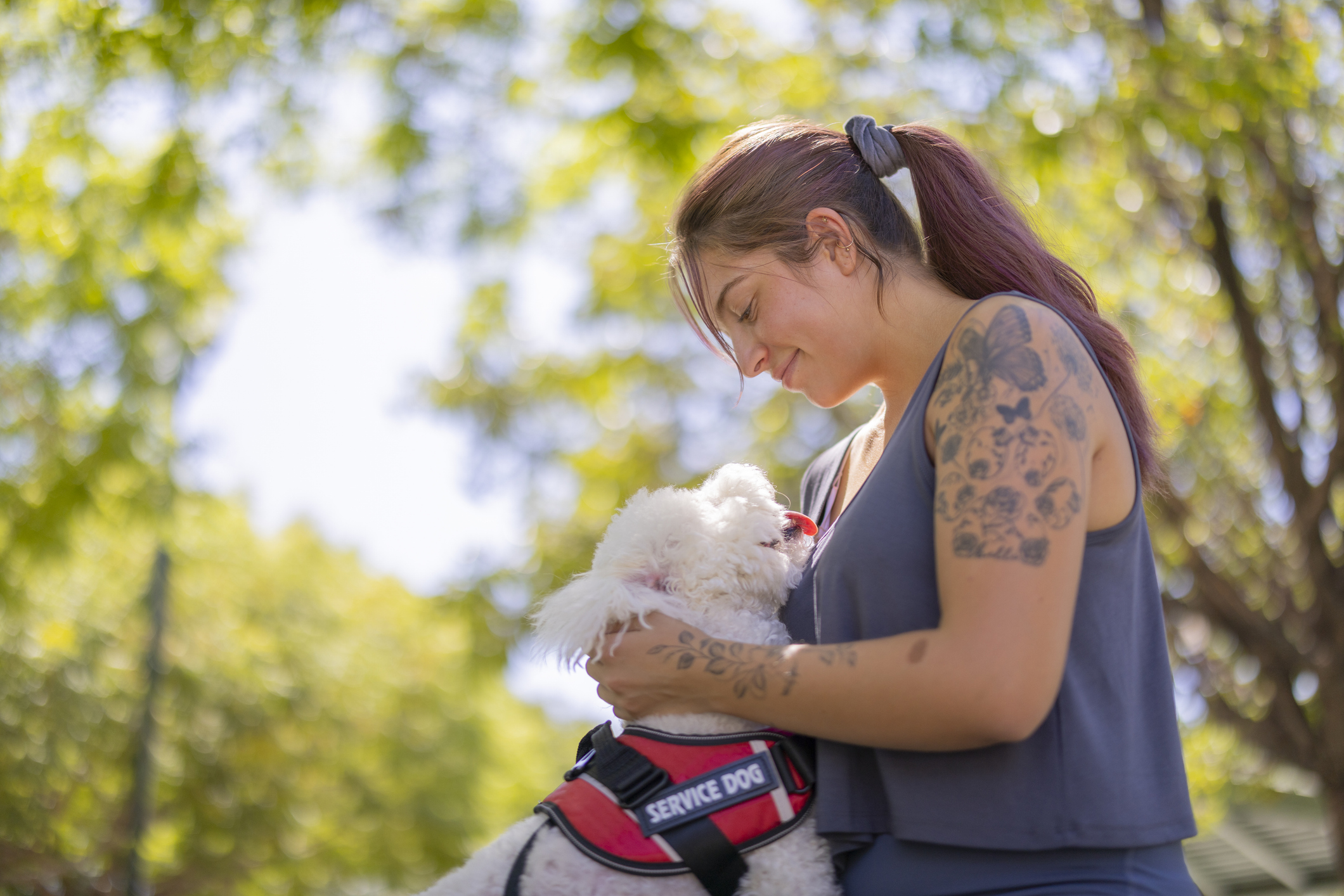
Table of Contents
Who Qualifies for an Emotional Support Animal?

Written By: Alex Bachert, MPH

Clinically Reviewed By: Meghan Jensen
April 23, 2025
6 min.
Emotional support animals provide companionship and emotional support. Here’s how to qualify for one.
Learn more about our Clinical Review Process
Table of Contents
People love their pets — and for good reason. Owning a pet offers countless mental and physical health benefits. Research shows it can increase feelings of happiness, security, and self-worth and may even help promote healthy aging. If your pet has a positive impact on your mental and emotional well-being, you may be wondering how to register them as an emotional support animal.
An emotional support animal is an animal that provides mental or emotional support, specifically for people with certain disabilities or conditions. They’re not trained to help with specific tasks and duties, but they can be taught to accommodate some of their owner’s needs. Below, we review the leading benefits of emotional support animals, how they compare with service animals, and how to add an emotional support animal to your treatment plan.

Get the support you deserve
Charlie Health providers can write letters for emotional support animals on a case-by-case basis.
What is an emotional support animal?
An emotional support animal is an animal that provides comfort, companionship, and therapeutic support to people dealing with mental or emotional health concerns. They aren’t ADA requirements (as recognized by the Americans with Disabilities Act), but they do qualify for rights under a federal law called Fair Housing Act (FHA). According to the FHA, people with disabilities have the right to “reasonable accommodations” for their emotional support animals. Under the FHA, landlords cannot:
- Charge additional fees for an assistance animal
- Ask for a person’s detailed medical records
- Refuse to accommodate your request for an emotional support animal
- Require specific training or certifications for your animal
At this time, the FHA doesn’t specify which animals are eligible, so most domesticated pets are covered by the law. Dogs are the most common type of emotional support animal, but other examples include cats, birds, pigs, rabbits, mice, and miniature horses.
Emotional support animal versus service animal
Emotional support animals
Service animals
Animals that provide comfort to people with mental health conditions but aren’t trained for specific tasks or protected under the ADA.
Animals that are trained to perform tasks for people with disabilities and are protected under the ADA.
Unlike emotional support animals, service animals are covered by ADA requirements. This is because service animals are trained to perform tasks for a specific disability. One of the most common examples of a service animal is a Seeing Eye Dog. These animals are trained to provide travel assistance to people who are blind or have severe visual impairments.
Another type of service animal is a Psychiatric Service Dog, which is an animal that is trained to detect and manage the onset of psychiatric episodes. Psychiatric Service Dogs learn how to provide safety checks, conduct room searches, wake their handlers for work, and remind them to take their medicine.
What disabilities qualify for an emotional support animal?
“Under U.S. Law, an ESA can be prescribed to anyone who has a disability. It can be a physical or mental impairment that causes a significant limit on major life activities or activities of daily living. The animal has to provide some sort of therapeutic benefit,” explains Charlie Health Group Facilitator Clary Figueroa, MSW.
According to Alysson Thewes, MSW, LCSW, a Senior Primary Therapist with Charlie Health, “psychiatric disorders across the spectrum can qualify one to have an emotional support animal. These range from major depressive disorder to bipolar disorder I and II, to name a few.”
Other conditions that typically qualify for an emotional support animal include:
- Anxiety disorders, such as generalized anxiety disorder (GAD), social anxiety, and specific phobias
- Attention-deficit/hyperactivity disorder
- Post-traumatic stress disorder (PTSD)
- Autism spectrum disorder (ASD)
A person may also be eligible for an emotional support animal if they’re struggling with a physical impairment such as seizures, fainting, and food allergies, adds Figueroa.
What are the benefits of an emotional support animal?
While there’s a wealth of research documenting the health benefits of owning a pet, there’s less published on the health benefits of emotional support animals in particular. That said, one recent study found that having an emotional support animal significantly helped with symptoms of depression, anxiety, and loneliness associated with chronic mental illness.
Here are some other possible benefits of having an emotional companion animal.
1. Pets can reduce anxiety
If you view your pet as a comfort animal, having them by your side may help reduce stress and anxiety levels. “Many people say that having an ESA helps to reduce anxiety and panic attacks. Just petting an animal can release oxytocin and dopamine,” says Figueroa.
2. Pets can increase confidence
Having a comfort animal provides “confidence in navigating situations that otherwise might feel very difficult or impossible,” says Thewes. “I think of Agoraphobia and the confidence an animal can provide a person with when leaving the home, even if at first it is just to meet the animal’s needs (like taking him to the park or a veterinarian),” she continues.
3. Pets can provide companionship
Emotional support animals “provide companionship and can help battle feelings of loneliness,” says Figueroa. They can also encourage people to be more social and explain their social support network.
4. Pets can create structure and purpose
Another benefit is the “feeling of purpose in caring for another living being,” explains Thewes. Figueroa agrees, commenting that “caring for an animal can create and keep structure and routine. People with PTSD may feel more calm and safe with an ESA.”

Considerations for getting an emotional support animal
If you’re struggling with a mental health disorder or disability, you may be eligible for an emotional support animal. The first step is to speak with a healthcare professional, such as a primary care provider or mental health professional.
They can prescribe an emotional support animal letter, which states that you’ve been diagnosed with a mental health condition and that your animal is providing mental or emotional health benefits. An ESA letter is the only proof required to qualify your pet as an emotional support animal, though there are still a few factors to consider regarding where you can bring your animal.
1. Housing
The FHA states that housing providers are required to permit emotional service animals on their properties, even when pets aren’t typically allowed.
2. Flying
As of 2021, U.S. airlines are no longer permitting emotional support animals on flights. If your emotional support animal meets the airline’s requirements for pets, they may be allowed to fly for a fee but don’t receive ADA protections.
3. Public spaces
“Since ESAs are not service animals, there may be limitations on places where they can be allowed — like stores, restaurants, etc.,” says Figueroa. Before bringing your emotional support animal to a public space, it’s best to inquire about their pet policy.
There aren’t many rules regarding which animals qualify as emotional support animals, but you should still be mindful of whether or not your pet is the right fit. When choosing an assistance animal, consider the animal’s temperament and behavior and your ability to take care of its needs.
“Many ESAs do not receive formal training, so it is up to the owner, and this may be challenging for some and take time,” says Figueroa. “An ESA also needs to be looked after, going to the vet and receiving routine care, so this may put some financial strain on a person, especially if they are not prepared for such costs.”

How Charlie Health can help
As part of a larger treatment plan, having a companion animal may help improve happiness, confidence, and overall mental well-being for people with chronic mental illness or a mental disability. If you’re interested in learning more, consider Charlie Health. Mental health professionals at Charlie Health can provide letters for emotional support animals on a case-by-case basis.
Charlie Health’s virtual Intensive Outpatient Program (IOP) provides more than once-weekly mental health treatment for people and families dealing with serious mental health conditions, including anxiety and depression. Our expert mental health professionals incorporate evidence-based therapies into individual counseling, family therapy, and group sessions. With this kind of holistic online therapy, managing your mental health is possible. Fill out the form below or give us a call today.
References
https://adata.org/guide/service-animals-and-emotional-support-animals
https://www.hud.gov/helping-americans/assistance-animals
https://www.akc.org/expert-advice/news/everything-about-emotional-support-animals/
https://esadoctors.com/airline-requirements-for-traveling-with-an-emotional-support-dog
https://www.mdpi.com/1660-4601/14/6/642




